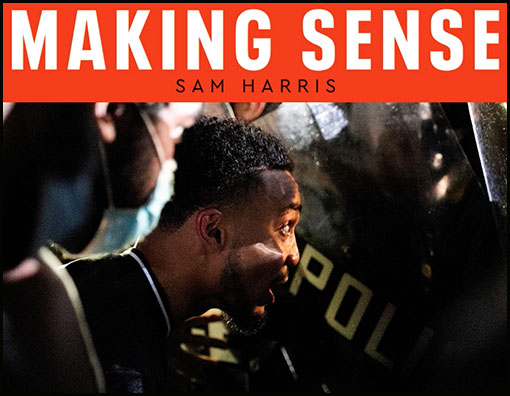1049 Making Sense of BLM
The question is: Does the Black Lives Matter movement make sense? Is it on the right track? This is a loaded podcast from Sam Harris. I agree with those who deem Harris one of the sharpest minds on the planet ... and here he makes some unsavoury points about racism, police violence - especially police violence against blacks - and how we consume the information that underlies Black Lives Matter.

#207 - CAN WE PULL BACK FROM THE BRINK?
When listening - since it is not a video - read the transcript,
provided on the Sam Harris website.
This is a two hour podcast ... I'll try and get to the gist of it; says Harris:
June 18, 2020
In this episode I discuss the recent social protests and civil unrest in light of what we know about racism and police violence in America and suggest what it might take to pull back from the brink here.
The amount of misinformation in the air—the degree to which even serious people seem to be ruled by false assumptions and non sequiturs—is just astonishing.
We have a President who is an incompetent, divisive conman and a crackpot ... at a time when we actually need wise leadership. All of that is hard to put on a sign, but it’s all worth protesting.
Nothing I’m going to say denies that we should condemn racism. But as a society, we simply can’t afford to find and condemn racism where it doesn’t exist.
So, does the killing of George Floyd prove that we have a problem of racism in the United States? Most people seem to think the answer is YES, and it’s a yes that now needs to be shouted in the streets. The problem, however, is that if you take even 5 minutes to look at the data on crime and police violence, the answer appears to be “no”.
As you’re about to see, the police used more deadly force against white people—both in absolute numbers, and in terms of their contribution to crime and violence in our society. But the public perception is, of course, completely different.
In a city like Los Angeles, 2019 was a 30-year low for police shootings. Think about that. If you care about justice—and you absolutely should—you should care about facts and the ability to discuss them openly. Justice requires contact with reality.
So just take a moment and think this through with me. One thousand people are killed by cops in America each year. There are about 50 to 60 million encounters between civilians and cops each year, and about 10 million arrests. That’s down from a high of over 14 million arrests annually throughout the 1990’s.
There is also a distortion in the media. The media is not showing us videos of white people being killed by cops. Again, cops kill around 1000 people every year in the United States. About 25 percent are black. About 50 percent are white. The data has been pretty carefully tracked by sources like the Washington Post, for the last 5 years.
Consider a few more facts: Blacks are 13 percent of the population, but they commit at least 50 percent of the murders and other violent crimes and the overwhelming majority of their victims are black.
And here we arrive at the core of the problem. The story of crime in America is overwhelmingly the story of black-on-black crime. It is also, in part, a story of black-on-white crime. For more than a generation, crime in America really hasn’t been a story of much white-on-black crime.
The murder rate has come down steadily since the early 1990’s. But, nationwide, blacks are still 6 times more likely to get murdered than whites, and in some cities their risk is double that. And around 95 percent of the murders are committed by members of the African American community.
It is almost entirely a story of black men killing members of their own community. And this is far more representative of the kind of violence that the black community needs to worry about.
We need police reform—there’s no question about this. And some of the recent footage of the police attacking peaceful protests is outrageous. Nothing I just said should signify that I’m unaware of that.
But racializing how we speak about the problem of police violence, where race isn’t actually the relevant variable, this has highly negative effects. Think about how crazy this is in a nation where gun ownership is so widespread.
Why is all of this happening now? Police killings of civilians have gone way down. And they are rare events. They are 1/10,000 level events, if measured by arrests. 1/50-60,000 level events if measured by police encounters. And the number of unarmed people who are killed is smaller still. Around 50 last year, again, more were white than black.
We need to lower the temperature on this conversation, and understand what is actually happening in our society. But I think that what we are witnessing in our streets, and on social media, and even in the mainstream press, is a version of mass hysteria.
And the media has turned these videos into a form of political pornography. And this has deranged us. We’re now unable to speak or even think about facts. The media has been poisoned by bad incentives, in this regard, and social media doubly so.
We have to pull back from the brink here. And all we have with which to do that is conversation. And the only thing that makes conversation possible is an openness to evidence and arguments.
Stay safe, everyone.